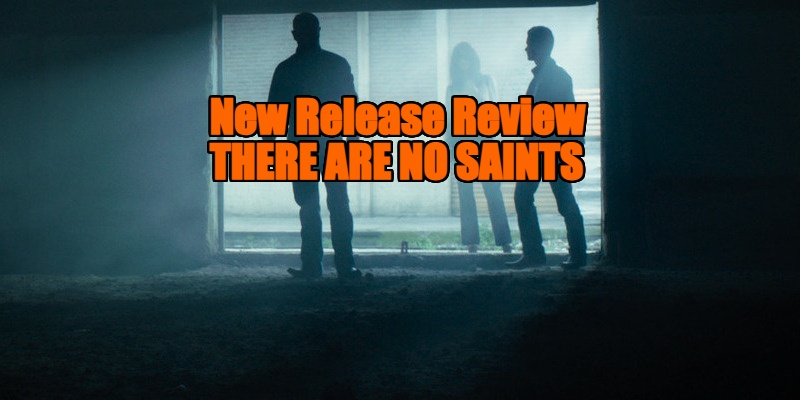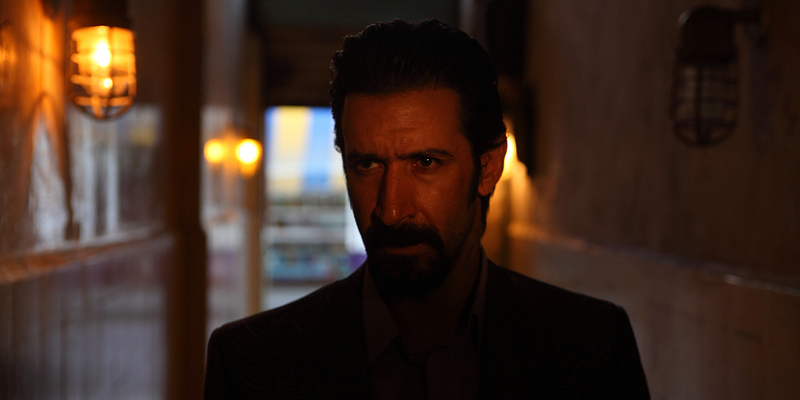
Review by
Eric Hillis
Directed by: Alfonso Pineda Ulloa
Starring: Jose Maria Yazpik, Ron Perlman, Tim Roth, Shannyn Sossamon, Paz Vega, Neal McDonough, Tommy
Flanagan, Kiedrich Sellati

At one point in There Are No Saints, a villain played by Ron Perlman repeats the old adage that
"Good artists borrow, great artists steal." It would seem to be a
sentiment Paul Schrader, who surprisingly penned the screenplay
for this otherwise unremarkable revenge thriller, agrees with. Schrader
would be the first to admit that he's stolen from some of his favourite
filmmakers throughout his career, but he's also not above stealing from
himself. His script for There Are No Saints is almost a
copy and paste reworking of his 1979 classic Hardcore, but with George C. Scott's uptight MidWest father swapped out for a
SouthWest cartel enforcer.

The warning signs that Schrader may not be bringing his A-game to this
project arrive as early as the opening scene. A crudely written radio
show lazily fills in the backstory of our stone-faced anti-hero, "The
Jesuit" (José María Yazpik). Having spent the past four years in
prison, he's now been released after an official confessed to lying in
order to see him incarcerated. After a quick meeting with his improbable
cockney lawyer (Tim Roth), who warns him to leave town before his
enemies catch up with him, The Jesuit visits his ex-wife (Paz Vega) and demands to see his son, Julio (Kiedrich Sellati), before
he skips town. Julio hints that his mom's new boyfriend, property tycoon
Vincent (Neal McDonough), may be a wrong 'un, leading The Jesuit
to decide to stick around with disastrous consequences for his wife, who
is murdered, and his boy, who is abducted. Having vowed to quit "the
life," The Jesuit uses his specific skills to track down the man
responsible for his boy's kidnapping.

It's difficult to tell whether director Alfonso Pineda Ulloa has
botched Schrader's script or the legendary screenwriter just knocked it
out over a weekend to settle a few bills. I'm inclined towards the
latter. While rehashing his familiar characters and themes (religious
guilt, a "whore" figure aiding the solemn male protagonist, a descent
through a hellish underworld), Schrader struggles to fit his worldview
into the sort of thriller Liam Neeson now makes a living headlining.
It's all a big mess, and in its worst moments it feels like it was
written by a film student who just discovered '90s era Lynch and
Tarantino. The SouthWest setting and collection of oddball characters
come off as second rate Barry Gifford while the cringey speeches are
straight out of one of those awful Tarantino knockoffs that filled the
shelves of video stores back in the day.
The movie doesn't seem to know what to make of its protagonist. Had
Schrader directed this, The Jesuit would no doubt be a lot more nuanced
than he's portrayed here. We get flashbacks that show he's by no means a
good man, yet the film wants us to feel empathy for him rather than
simply allowing us to root for someone we don’t like to take down
someone even worse. Schrader pulled this off brilliantly in the past
with Hardcore and Taxi Driver, which both gave us unlikable anti-heroes yet managed to get us on
their side when they came up against the very definition of unambiguous
evil. Schrader once again puts children in the hands of sexual
exploiters in order to get us on his surly protagonist's side, but the
villains are so lazily drawn that we can't take any of it
seriously.

Most of the cast don’t seem to be taking this seriously either, but
they are at least having more fun than the audience.
Shannyn Sossamon is a ball of fire in the Season Hubley role of a
sassy bartender recruited by The Jesuit, while McDonough is clearly
having a blast imitating Larry Hagman's JR Ewing. Scottish actor
Tommy Flanagan delivers one of the worst Irish accents I've ever
heard as an arms dealer named "Jet Rink." Beyond the occasional
over-the-top but fun performance, there's little to recommend
There Are No Saints, but if it helps finance Schrader's next directorial outing it will
have been worth something.


